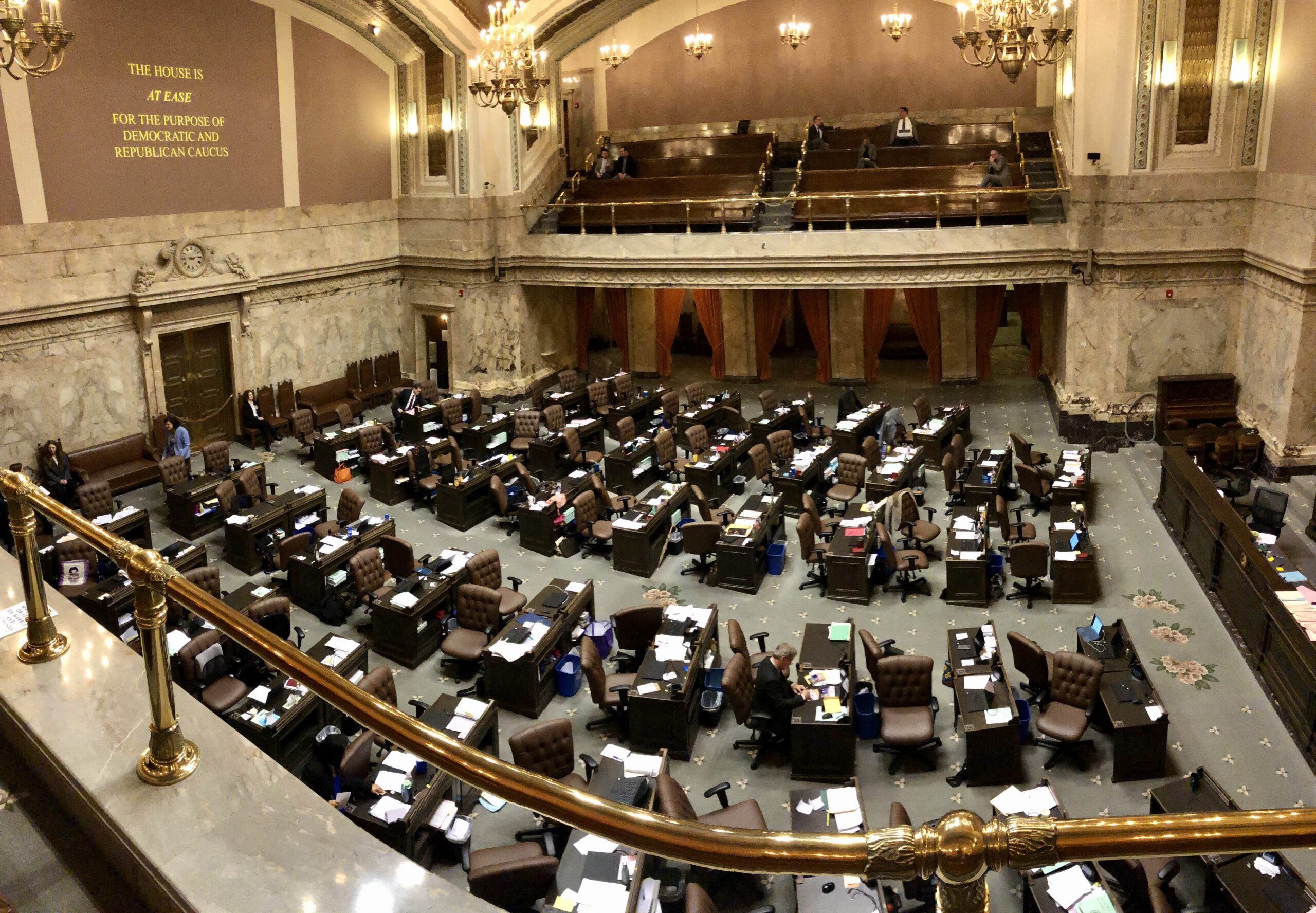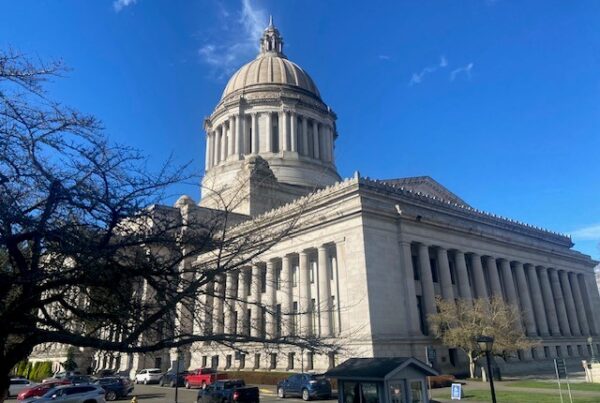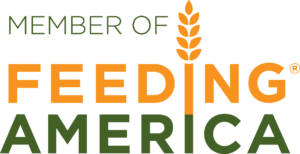
At the time of writing, this is the 51st day of the sixty-day 2022 Washington State Legislative Session. What follows is an update on Food Lifeline’s 2022 Advocacy Agenda and our priorities that are currently in motion. Legislative session ends on March 10.
On balance, we are seeing great progress on our top policy priorities and significant funding levels in the House Operating Budget (ESSB 5693 w/House Amendments, Passed 2/26). A few loose ends remain in the Senate Operating Budget that we’d like to see align with the House proposal. Our remaining advocacy work will be focused on reconciling any differences between the House and Senate budgets.
The first of our priorities to cross the finish line is the School Meals Community Eligibility expansion, HB 1878, by Representative Marcus Riccelli. This bill expands free school meal access for as many as 90,000 students in Washington who attend schools or school districts with high needs. Representative Riccelli has championed this issue for many years and we applaud his efforts. Having passed both chambers, the bill resides with Governor Inslee to be signed into law.
EQUITY & SOCIAL JUSTICE
SB 5793 – Concerning stipends for low-income or underrepresented community members of state boards, commissions, councils, committees, and other similar groups, by Senator Claire Wilson.
STATUS: Feb 10, Passed Senate – Floor vote 31-18. Sent to House. Feb 28; Referred to House Rules Committee for consideration.
A measure we oppose is HB 2037 – Modifying the standard for use of force by peace officers, by Representative Roger Goodman. We prefer the previously passed higher standard which has shown results in fewer fatal encounters for Black, brown, and Indigenous people.
STATUS: Feb 12, Passed House – Floor vote 87-11. Feb 24, Senate Rules Committee for Second Reading.
Equity & Social Justice Budget Asks
Extend Basic Food (SNAP) Education & Training to immigrants receiving Food Assistance – Immigrants who receive state-funded Food Assistance should have equal access to job training and education opportunities that help lift families out of poverty and into living wage jobs. We are supporting the $560,000 requested in the Governor’s budget.
STATUS: Fully funded in both House and Senate Operating Budgets.
POVERTY
A bill to make technical fixes to the Working Families Tax Credit that passed last session, HB 1888, by Representative My-Linh Thai. Starting in 2023, the Working Families Tax Credit program will provide payments ranging from $300 to $1,200 to low-to-moderate income individuals who meet certain eligibility requirements. This bill helps mitigate Washington’s regressive tax code.
STATUS: Feb 8, Passed House – Floor vote 87-9. Feb 28, Passed to Senate Rules Committee for second reading.
SB 5838, by Senator T’wina Nobles (HB 1947, Representative Noel Frame), Providing a monthly diaper subsidy for parents or other caregivers receiving temporary assistance for needy families. Helping mothers experiencing deep poverty with this benefit is critical to the health and well-being of children and families.
STATUS: Feb 10, Passed in the Senate by a Floor vote of 48-1. Feb 28, House Referred to Rules Committee.
HB 1755, Concerning temporary assistance for needy families, time limit extensions during times of high unemployment, by Representative Strom Peterson. As the title suggests, the bill would allow for an extension to the program’s five-year limit when the most recently published state unemployment rate is 7 percent or higher. We support this bill for the important help it provides to families with children living with deep poverty.
STATUS: Feb 12, Passed House floor by vote of 79-19; Feb 25, Placed on second reading by Senate Rules Committee.
We additionally support extending Transitional Food Assistance to more families leaving TANF (SB 5785) and ending the 60 month time limit for “TANF for children” and very low income families who face hardship (e.g. homelessness) or are meeting all program requirements (HB 2048).
STATUS: Bills died; policy intent will be attempted in the operating budget.
HB 2075 – Establishing service requirements for the department of social and health services, by Representative Strom Peterson. This bill would ensure DSHS’ local Community Service Offices and call centers must be available and accessible for people in need of services to meet their basic needs. Bill calls for office to reopen and call wait times must be below 30 minutes.
STATUS: Feb 15; Passed House with a floor vote of 97-1. Feb 23, Placed on second reading by Senate Rules Committee.
Poverty Budget Asks
State Housing Trust Fund & Rental Assistance – The House Capital budget bill includes $521 million for affordable homes, including the Housing Trust Fund, rapid acquisition program and a new Health and Homes account for Permanent Supportive Housing. House and Senate Operating Budgets both include $4.5 million for foreclosure prevention and funded an increase to the Aged, Blind, and Disabled cash grant from $197 per month to $417 per month. The Senate funded $2 million for pre-eviction legal civil aid, while the House funded it at $1.6 million. There is still a difference to resolve in funding for Homelessness Workforce Retention (House funded $78 million, Senate zero) and Rental Assistance (House funded $55 million, Senate zero).
FOOD SYSTEMS
HB 1799, Concerning organic materials management, by Representative Joe Fitzgibbon, focuses on reducing methane produced by landfills – which is primarily caused by organic material, like food and yard waste. One of many strategies it takes, is to set conditions to encourage more food donations to food banks. It would create a “Washington Center for Sustainable Food Management” to help coordinate, support, and align food donation efforts, and coordinate statewide food waste reduction. And it would update the Washington State Good Samaritan Act to broaden liability protections in place to encourage more food donation.
STATUS: Feb 11, Passed House by Floor vote of 56-42; sent to the Senate. Feb 28, Placed on second reading by Senate Rules Committee.
Food Systems Budget Asks
“We Feed WA” is the Washington State Department of Agriculture program that purchases local produce for emergency food boxes and bulk produce for hunger relief agencies in the state. Funding requested for this program is indispensable to helping the state continue its recovery from the pandemic. It supports local Washington farmers and people benefit from the wonderful food they produce.
We support the Governor’s budget request to add $15 million to the current fiscal year budget and an additional $43 million to fiscal year 2023. In addition, we support the WSDA’s Resiliency & Capacity grants request for $17.125M. These funds would help hunger relief agencies across the state build additional capacity to serve their communities.
STATUS: Fully funded in House Operating Budget. Senate Operating Budget does not presently have an appropriation for the WSDA Resiliency & Capacity grants.
HUNGER & HEALTH
We are supporting a $400,000 budget request to expand the Washington Senior Farmers Market Nutrition Program. The modest investment sought helpS provide nutrition assistance to 7,100 more lower income adults over 60.
STATUS: Funded in House Operating Budget: $1.5 Million (this would expand the benefit from $40 to $80 per market season and enroll more seniors.
Nutrition Assistance / School Meals
One of the most important child hunger bills this session deals with K-12 school meals and Community Eligibility expansion, HB 1878, by Representative Marcus Riccelli (SB 5798, Senator Claire Wilson). This bill expands our state’s participation in a federal nutrition program that would qualify more than 95,000 additional students for federally reimbursed school meals (meaning no cost to the student).
STATUS: Feb 10, Passed House – Floor vote 93-3. Passed Senate by vote 45-4. Sent to Governor.
We support improving and easing access to school meal applications as proposed by HB 1833, School meals/online application, by Representative April Berg. This bill makes it easier for parents statewide to apply for school nutrition programs on-line and in their language – barriers that have prevented many families from accessing important benefits. It also makes managing the data easier for schools.
STATUS: Feb 11, Passed House floor by vote 92-4. Feb 24, Passed to Rules Committee for Second Reading.
Taken together, these bills would vastly expand the number of students qualifying for and accessing school nutrition assistance.
Other bills we’re tracking that have a connection to our mission (not an exhaustive list):
HB 1592 – Concerning military spouse employment, by Representative Mari Leavitt.
STATUS: Feb 11, Rules Committee relieved of further consideration. Placed on second reading.
HB 1781 – Concerning the capital budget, by Representative Steve Tharinger.
HB 1264 – Establishing an equity impact statement for legislative proposals, by Representative My-Linh Thai (SB 5274, by Senator Bob Hasegawa). With the Washington State Office of Equity up and running, we are eager to realize additional equity measures, like HB 1264, come into place.
STATUS: Died in Committee.
SB 5438 – Providing unemployment benefits to workers who are unemployed as a result of the COVID-19 pandemic and not eligible for unemployment benefits due to immigration status, by Senator Rebecca Saldaña. This bill would help reduce the poverty rate of the immigrant community in Washington as the pandemic has left many who work in low-wage industries unemployed.
STATUS: Died in Committee.







